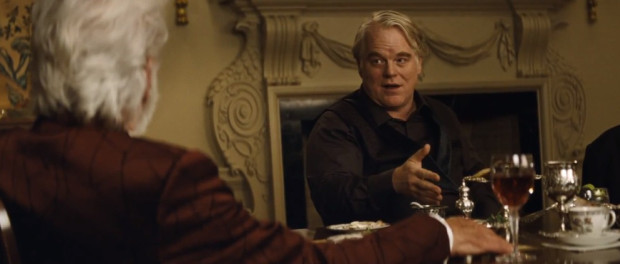To An Actor Dying Not So Young
If I hadn’t seen the Hunger Games: Catching Fire a week ago, I probably wouldn’t be writing about the death of Philip Seymour Hoffman. There are plenty of obituaries for the Oscar winning actor that far exceed the sentiments and depth of knowledge that I can offer. However, his passing struck me because just a week ago, I was reflecting on how Hoffman adds levels of depth to the most fleeting of roles. His character Plutarch Heavensbee barely appears in the film compared with Jennifer Lawrence’s Katniss, Woody Harrelson’s Haymitch, or Donald Sutherland’s President Snow. All were solid, but it’s Hoffman’s performance that stayed with me afterwards. In particular, I was impressed how he could take this difficult, ambiguous character, a character that so easily could have been botched by even a good actor, and made him compelling. Hoffman didn’t go for what was easy; he played Heavensbee as edgy rather than slick, unreliable rather than certain. These subtleties could be misconstrued, invisible, or just plain overdone. It takes confidence to play a role with such risk. It takes a special gift to pull it off.
Hoffman brought this gift to every single role. Did it matter that he wasn’t exactly eye candy with his pale features and puffy, reddish face? Film after film, he held my attention on screen. And he caught my attention no matter the character played. A good thing, since I don’t think he ever played two roles the same. And so many of these roles turn up in my favourite film list. The one scene appearance of the angry ex and native-rights-activist in Next Stop Wonderland. A snooty Princetonian in The Talented Mr. Ripley. The Voice of drugged-up reason Lester Bangs in Almost Famous. An understanding nurse in Magnolia. The spurned, depressive neighbour in Happiness. And he didn’t just stay behind the scenes, a supporting actor. Hoffman went on to carry Capote and Schenectady. His theatre career, something I never saw in person, is regarded as equally impressive, if not more so, than his film one.
We often call it a tragedy when young actors die — Heath Ledger or River Phoenix, to name two. Hoffman’s death at 46 in theory should be less painful. A premature death to be sure, but he wasn’t young. Yet, it doesn’t seem less of a tragedy than the death of actors half his age. In fact, it seems even worse, since we know something of the scope of his talent and know it probably hadn’t exhausted itself yet. Perhaps the fact that the death of someone not so young only gives some boost to the sentiment that we always die too soon.






